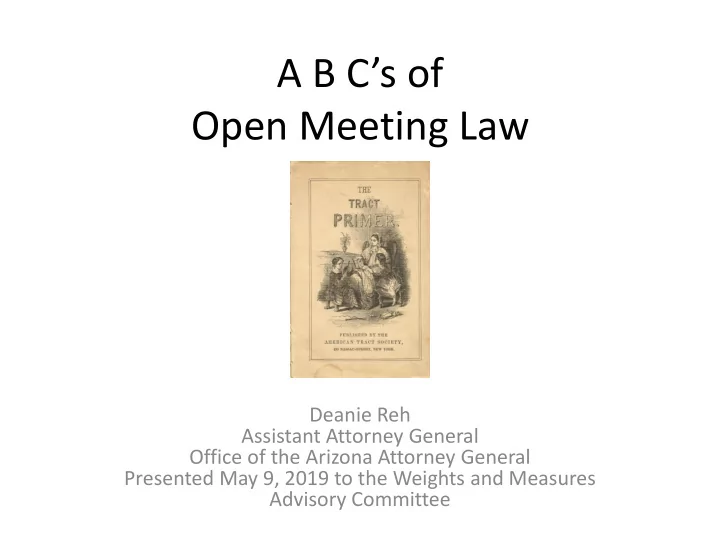

A B C’s of Open Meeting Law Deanie Reh Assistant Attorney General Office of the Arizona Attorney General Presented May 9, 2019 to the Weights and Measures Advisory Committee
(A)ccessibility NOTICE • Disclosure of locations of posting, and posting of regular meetings. • Post notice of meeting and agenda no less than 24 hours prior to meeting (does not include holidays and weekends). • Notice must list date, time and location of meeting, and options for persons with disabilities. • Cannot discuss matters not listed on the agenda. • Record the proceedings and/or take minutes. • Minutes or recording must be posted in 3 days. • Cannot discuss matters outside the meeting (polling, splitting the quorum, email, reply all). Even a social gathering will need to be posted, and no action or discussion should take place.
This meeting will now come to order.
(A)ccessibility ENABLING ATTENDANCE AND PARTICIPATION • Location is not isolated. • Time and date are reasonable. • Room is large enough. • Call to the public: Call to the Public: “ This is the time for the public to comment. Members of the Board may not discuss items that are not specifically identified on the agenda. Therefore, pursuant to A.R.S. § 38-431.01(H), action taken as a result of public comment will be limited to directing staff to study the matter, responding to any criticism or scheduling the matter for further consideration and decision at a later date. ” • Cannot require a sign-in sheet, except for those who wish to speak. • Ability to call in remotely.
Is that an open meeting or a mirage?
(A)ccessibility REQUIREMENTS FOR MINUTES • The date, time and place of the meeting. • The members/officials who were present or absent. • A general description of the matters considered, and identification of all speakers who participated in the discussion, including members. • An accurate description of all legal actions proposed, discussed or taken, including a record of how each member voted. Best practice includes roll call votes. • The names of the members who proposed each motion. • The names of the persons who made statements or presented material to the public body with reference to the matter to which the statement or presentation relates.
Vice- chairman Hipp O. Potamus voted “nay” on allowing humans to cross the river.
(A)pplication to You • You have authority only to study, evaluate, make recommendations. • Your decisions regarding recommendations are your “official legal actions.” • All discussions and decisions regarding your recommendations must be made in a meeting that is open to the public.
What?! We’re covered by the open meeting laws?
(A)ssistance • The open meeting laws are found at Arizona Revised Statutes (“A.R.S.”) §§ 38-431 to -431.09. • A great resource is the Arizona Agency Handbook at https://www.azag.gov/outreach/publications/age ncy-handbook. • OR, just type “Arizona Agency Handbook” into your browser. • OR, ask your legal counsel for advice.
Relax – you have it covered.
(B)reaking Down (B)arriers The open meeting law promotes transparency and openness in government meetings • So if you don’t remember the exact requirements of the law, you can use that concept of transparency and openness as a general guide. • What is a meeting? A gathering of a quorum of a public body where matters are discussed and/or decided – where official discussion is held and/or action is taken. • A quorum is a majority of the members of a board or commission. • Action by board may only occur at a public meeting.
The public’s eye is upon you.
(C)onfidentiality EXECUTIVE SESSION A board may discuss limited confidential matters in executive session, which will not be open to the public: • Employment; • Discussion of legally confidential records; • Legal advice; • Instruction to attorneys in contract negotiations or litigation; • Collective bargaining; • International, interstate tribal negotiations; or • Purchase of real property – negotiation instructions.
I move that we go into executive session .
(C)onfidentiality EXECUTIVE SESSION RULES • Cannot make decisions in executive session of any kind. • Cannot plan decisions in executive session (straw vote). • Cannot discuss what was said or transpired in executive session with anyone who was not present, except – Another board member; – Person subject to personnel discussion; – Staff personnel, to prepare minutes; – Board’s legal advisor; – Auditor General, AG, or County Attorney when investigating violations; or – The court, when a violation has been alleged.
You can’t touch this!
(C)onfidentiality MORE EXECUTIVE SESSION RULES • Before closing an open session to go into executive session, the chairman of the public body should ask the public to leave and to take with them all materials such as briefcases and backpacks to ensure that no recording devices are left in the room. • The following statement should be read into the record at the start of every executive session: “ Minutes of and discussions made at an Executive Session are required by law to be kept confidential and shall not be communicated to any person outside this meeting room, except to members of the Board, a person who is the subject of an employment discussion, the Auditor General in connection with an audit authorized by the law, and the Attorney General. ”
Now, let’s get serious.
(C)onsequences THINGS THAT COULD HAPPEN IF YOU MESS UP • An action taken in violation of the open meeting law will be null and void. • Can be investigated by the AG and County Attorneys. • Civil penalties: maximum of $500 for second knowing violation; and $2500 for subsequent such offenses. • Attorney’s fees and costs. • Removal from office. • Self-reporting and ratification can help fix an accidental mistake.
The End
Recommend
More recommend